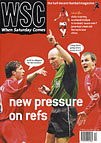 David Harrison looks back on the life of Bertie Mee – a truly unique achiever
David Harrison looks back on the life of Bertie Mee – a truly unique achiever
On February 18, 1939, a young man, barely out of his teens, pulled on Mansfield Town’s No 11 shirt and ran on to the Vicarage Road pitch, to make his third League appearance. Fifty years on, he was again observing that same expanse of muddy turf, only by now operating as the home club’s first-ever paid director.
Much of what Bertie Mee achieved in that intervening half-century has been well documented, but bears repetition nevertheless. Injury forced premature retirement, leading to six years in the Royal Army Medical Corps, followed by a further 12 providing rehabilitation for disabled ex-servicemen. Not until 1960 was he lured back into football, as Arsenal’s trainer and physiotherapist.
Bertie took over from Billy Wright as manager and brought in the likes of Bob McNab and George Graham on the playing side, plus Dave Sexton and, crucially, Don Howe on to the coaching staff. Winning the Double in 1971 was naturally the achievement that featured most prominently in the obituaries after Mee’s death on October 22.
But there was another footballing peak that Bertie Mee attempted to scale – one every bit as challenging as that of returning Arsenal to former glories. When Bertie’s time with Arsenal had run its course, he “retired” at the age of 57. A couple of unsuccessful seasons had taken the gloss off the earlier triumphs and all agreed that it was time to part. Bertie left Highbury at the end of the 1975-76 season and went home, ostensibly to tend the lawn.
Well, those edges must have been razor-sharp because it was over a year later that Bertie returned to the game, alongside Graham Taylor and Elton John, at Watford. The challenge was to help turn the shambolic little Hertfordshire club, where the groundsman’s greyhounds slept in the dressing room plunge-bath, into a credible footballing force. The reality was considerably tougher than that.
Remember, we’re not talking here about the well-groomed, media-friendly manager/ chairman duo who subsequently charmed their way through countless Match of the Day interviews, as the Hornets bolted through four divisions and into Europe. There was a chairman with glasses the size of dinner plates and an ego to match and an inspirational manager, only just into his thirties and so transparently ambitious that, even then, one sensed the long-distant England job was a possibility. The call went out for for the little chap in the trilby. Lapsed Watford fans took notice. “Bertie Mee? At The Vic? Bloody hell, they must be serious,” was the consensus. And serious they were.
The credibility he brought to the club can never be over-estimated. Parents of precocious schoolboy talents – among them John Barnes – were no longer door-stepped by some tired old pro but by the most dignified figure in British football. The youth policy blossomed, the club blossomed and Graham Taylor’s career blossomed. Fifteen years he stayed, outlasting Taylor and collecting an OBE in the process. Eventually, though, the charmless post-Elton regime tired of him and Bertie, dignified to the end, simply walked away.
Of course Bertie Mee couldn’t happen in today’s football environment. With neither an international cap nor formal coaching qualification to his name, some poisonous combination of the tabloids, together with the “Show Us Yer Medals” brigade, would have ended his career before it began.
But they didn’t and fans of Arsenal and Watford were the main beneficiaries. Except that perhaps we should all take a little pleasure from the life of Bertie Mee, because this time there really will never be another.
From WSC 178 December 2001. What was happening this month